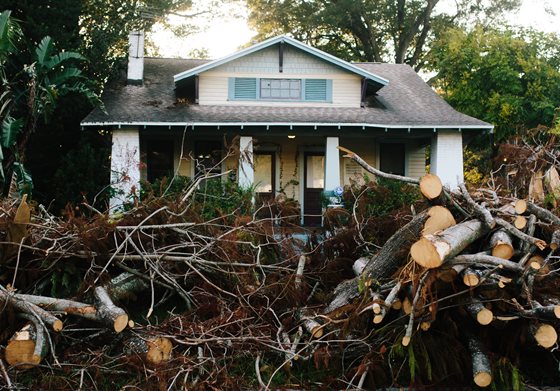 I recently spent a week working on Hurricane Harvey clean-up efforts with NeighborWorks network member Avenue and Fifth Ward Community Redevelopment Corp. in Houston.
I recently spent a week working on Hurricane Harvey clean-up efforts with NeighborWorks network member Avenue and Fifth Ward Community Redevelopment Corp. in Houston.
The week started in a trailer park that sits along a bayou. Avenue heard from several families in the area and knew the trailer park had been hit hard. It also has donors and volunteers looking for information for families with specific needs. Our job was to document those needs to help Avenue match donors and volunteers with families.
We talked with a number of families who shared their hurricane stories. They described how the water flowed through the trailer park like a river and into their homes, several feet deep.
One family shared how now, a month after the storm, a significant portion of their floor remains exposed after it had to be completely torn out.
Another man said he was able to fix the flood damage in his home himself, but needs to get his car, which also had been flooded, running so he can go back to work.
All of the trailers we visited reeked of mold.
After a day of canvassing, Avenue modified its approach a bit and hired a videographer to document families’ stories. The video will more graphically spread word of the major challenges facing the trailer park.
I spent the rest of the week in Houston’s Fifth Ward with the NeighborWorks member there. Fifth Ward CRC has a disaster recovery plan and has delegated responsibilities across multiple staff members. This allows the agency to facilitate the work of a large number of volunteers.
The week I was there, staff was preparing for an event with 100 volunteers to help clean out (“muck and gut”) 10 homes. Pictures and other visuals don't do it justice, but this video shows an impacted street. The endless piles of debris removed from homes show the destruction Hurricane Harvey left behind.
Most of the families I talked with had no flood insurance and either had not yet applied for relief or had not yet heard back from FEMA. Many are elderly and living with relatives because their home was not habitable. I talked with a 67-year old disabled man in a wheelchair. He described laying on the sofa as three feet of water came into his home, then feeling the couch starting to float. Rescue boats came to his street, but he wasn't able to get out in time before they left the area. Even though it's likely his home has mold, he hasn't left because he doesn't have anywhere to go.
Fifth Ward CRC is providing direct assistance to folks him. The agency also is working with CDCs across Houston to coordinate efforts and is building a long-term strategy. As CEO Kathy Payton describes it, “This has to be our 'perfect storm'”. Her long-term vision is to elevate the community post-storm so it is even better than it was before the disaster.
CRC’s experience with facilitating large volunteer efforts in the past put it ahead of the curve. But a tremendous amount of time and coordination still is required to develop detailed plans that work in Houston and synch with those of other nonprofits, donors and volunteers. Then there's funding to be solicited, along with in-kind donations. The planning and implementation of all of this needs to happen quickly, considering the urgent, short-term needs of those impacted, and staff also must manage as much of their regular workloads as possible. And that doesn’t even address long-term recovery priorities.
After being on the ground for a week, I gained an appreciation for the scope of the recovery required. In addition to the immense financial and human capital needs, the rebuilding efforts will require a significant—almost inconceivable—amount of time, patience, flexibility and creativity.
Many thanks to Avenue and the Fifth Ward CRC staff for facilitating the opportunity for me to be part of the Harvey recovery efforts. And thanks to NeighborWorks America for supporting this outreach through our generous volunteer-leave policy.

